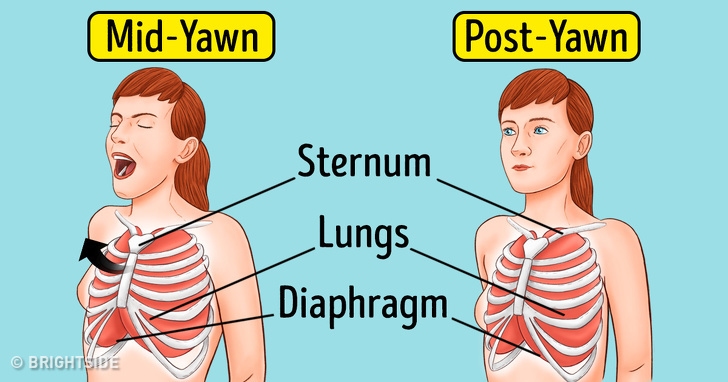
During an important conversation or at a business meeting, you suddenly start yawning (and often, over and over again) then you realize that you cannot control yourself. Meanwhile, the person you’re talking to may think that you are bored and uninterested, even if it’s not true. Why do we yawn and how we can fight it?
We at Bright Side collected for you the most common reasons for excessive yawning and tricks to get it back under control.
How do we yawn?

Physiologically, the process of yawning is quite simple: it is a long breath followed by a brief breath delay, during which the air reaches the stomach. Then follows a short exhalation, which is often accompanied by stimulation of the lacrimal glands — for this reason, while preparing for a crying scene, some actors begin to yawn heavily behind the scenes.
When we yawn, we involuntarily widely open our mouth and breathe in deeply. This allows air to fill our lungs, makes our sternum go up, abdominal muscles flex, and pushes down our diaphragm.
Why do we yawn?

According to one theory, a person yawns to cool down their brain. Experiments conducted by Austrian scientists have shown that the subjects who had a cold compress on their forehead yawned less when watching videos with people yawning than the subjects with a warm compress or without it. Those study participants who were asked to breathe only through their nose also yawned less because this kind of breathing provides cooler blood to the brain than mouth breathing.

Another purpose of yawning is the need to stretch and relax tired or cramped muscles. Mostly, it's the muscles of the pharynx and tongue, but could also be the muscles of the whole body. That is why usually a person stretches simultaneously with yawning. This workout for the muscles, in combination with cooling the brain, helps to put your body back on track.
Therefore, yawning often occurs when people are nervous before some important event, for example, students yawn before exams. For the same reason, people yawn when they want to sleep or get bored as yawning helps to cheer up your sleepy brain and numb your muscles.

Yawning is also helpful during a flight. It helps to get rid of the feeling of ear congestion that occurs during take-off or landing due to the pressure difference on both sides of the tympanic membrane. The pharynx is connected to the middle ear cavity with the help of special channels, yawning helps to equalize the pressure in the ears.
Yawning is contagious.

Yawning is a very contagious phenomenon. People start yawning not only at the sight of other yawning, but also when viewing videos or photos of yawning people. Often a person only needs to read or think about yawning to start doing it.
Scientists believe that the so-called mirror neurons are at the heart of the problem. These neurons which are located in the cortex of the human brain, and appear in other primates and some birds, make us empathetic. Mirror neurons determine the ability to imitate (for example, when learning new languages) and empathize.

In 2011, Italian scientists showed that contagious yawning is a consequence of emotional closeness. In the experiments mirror yawning often occurred in close relatives and friends of the yawning. Distant acquaintances were "infected" with yawning less often and mirror behavior rarely occurred in people unfamiliar with the yawning person. At the same time, gender and nationality did not affect this action.

Long-term frequent yawning can be a sign of various diseases, for example, problems with thermoregulation of the body, a sleep disorder, high blood pressure, thrombosis of the arteries or damage to the brain stem, where the respiratory center is located. In addition, frequent yawning can occur in people with increased anxiety or depression — because there is an increased level of cortisol, the stress hormone, in their blood. Therefore, if you are overcome by constant yawning, you should consult a doctor and check your heart, your blood vessels and your blood pressure.

Nevertheless, even though there are millions of explanations for yawning, this process is still considered extremely rude, no matter how natural it is. Most people at various workplaces believe that you need to hide your yawns so you don’t seem bored at business meetings or in front of your boss.
So how can we stop yawning all the time?

1. Breath through your nose.

According to a study published in the journal of Evolutionary Psychology, inhalation and exhalation of air through the nose can remove an attack of infectious yawning. Almost half of the volunteers who were told to breathe through their mouths or given no instructions at all were yawning while watching a video where the characters did the same. But none of the participants who were told to breathe through their nose yawned when watching the same video.
The researchers suggested that the desire to express fatigue appears only when your brain becomes too warm (overheats, gets tired). And if you breathe through your nose, it will help you to cool it down.
2. Relax and eat something cold.

In the second part of the same study on how to stop yawning, the results had a more direct approach to the issue of brain cooling. The researchers gave participants hand towels in packs that were hot, cold, or room temperature. Only 9% of the people who had cold bags in their hands yawned, compared to 41% of the other 2 groups.
Check the temperature in the room or eat something cold, like ice cream, if you want to cool down. But don't overdo it and don't get sick.
3. Take deeper breaths.

One general theory says that people yawn when their blood oxygen levels are low. On the other hand, levels that are too high can also cause fatigue. Even though this theory was proven to be wrong, deep breathing is still useful because it helps you to cool down your brain too. Slowly take a few deep breaths and then you will be able to stop yawning.
Do not switch to deep breathing too fast because your body could perceive it as hyperventilation and the problem will only worsen.
4. Go outside.

Being in the same place for long periods of time, like in front of a computer, is tiring for your mind. This can make you feel sleepy which could provoke yawning. A short-term change of environment can disrupt boredom. Go outside for a few minutes to stimulate your body with fresh air.
5. Drink a glass of water.

When your body is dehydrated, you may start feel more exhausted than you actually are. Drink a large glass of water to restore liquid balance in the body and to fight the desire to yawn.
6. Do some exercise.

If you feel uncomfortable in the middle of continuous yawning, your body might be hinting that you should move. Take a short walk to get a glass of water, or do a little stretch at your workplace if you cannot get up and walk. Also watch your daily habits because they can drain your energy.
If you know of other ways to stop excessive yawning, please suggest them in the comments below.
Preview photo credit EAST NEWS, ASSOCIATED PRESS/FOTOLINK Illustrated by Oleg Guta for BrightSide.me











